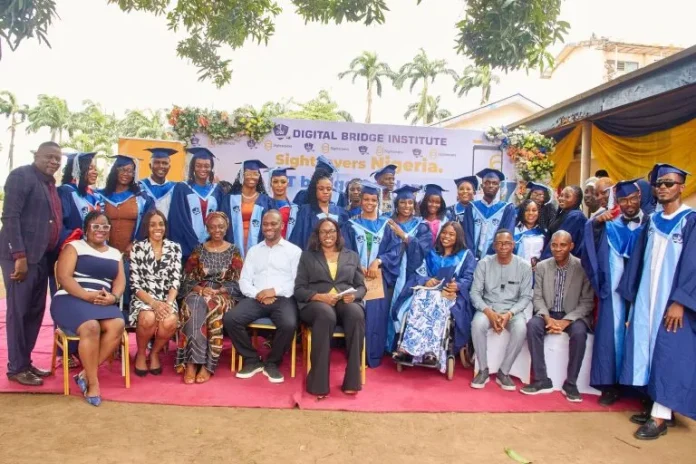Lagos/Kano, Nigeria – In a groundbreaking move to foster digital inclusion and empower Persons with Disabilities (PWDs) with in-demand tech skills, the Digital Bridge Institute (DBI), an affiliate of the Nigerian Communications Commission (NCC), has successfully graduated 48 PWDs from its IT Bridge Academy initiative.
The training programme, executed in collaboration with Sightsavers International, spanned nine months and equipped the graduates with crucial Information and Communication Technology (ICT) skills. The graduates—24 from DBI’s Lagos campus and another 24 from its Kano campus—underwent intensive training in Cisco Certified Network Associate (CCNA), along with complementary modules in Product Management, Digital Marketing, E-commerce, Data Analysis, and Visualisation.
A Bold Step Toward Digital Inclusion
Speaking at the graduation ceremony in Lagos, DBI’s President/CEO, David Daser, reaffirmed the institute’s commitment to bridging the digital divide and fostering equal opportunities for all, especially for individuals living with disabilities.
“This momentous occasion marks a significant milestone in our journey to empower persons with disabilities (PWDs) with the skills and knowledge required to thrive in the digital economy,” Daser stated.
Represented by DBI’s Group Head, Special Duties, Viola Askia-Usoro, Daser highlighted the importance of digital literacy in today’s job market and called on the public and private sectors to support initiatives aimed at empowering PWDs with employable skills.
“The IT Bridge Academy is more than just a training programme—it is a beacon of hope and inclusivity in Africa. We are committed to ensuring that PWDs are not left behind in the fast-evolving digital economy,” he added.
The Lagos graduation event was held on Thursday, while the Kano ceremony took place on March 20 at DBI Kano.
Addressing Barriers to Disability Inclusion
Acknowledging the unique challenges faced by PWDs, Daser noted that stigma, accessibility barriers, and limited training opportunities have historically hindered their participation in the digital space.
“Disability inclusion is still an evolving concept in Nigerian society, and to make meaningful progress, we need a multi-stakeholder approach,” he emphasized.
Daser lauded Sightsavers International for its role in co-developing the IT Bridge Academy, a programme specifically designed to bridge the gap between PWDs and digital employment opportunities.
“To achieve the noble objectives of this academy, Sightsavers partnered with DBI to ensure that PWDs have access to high-quality ICT training, paving the way for economic empowerment and career growth,” he added.
Graduates Poised for Impact
The newly trained PWDs have been urged to utilize their skills to drive innovation and contribute meaningfully to their communities.
Class Governor Amos Adegboyega and his deputy, Serena White, both visually impaired, reflected on their journey through the programme, highlighting the challenges and triumphs that defined their experience.
“This training was not just about technical skills; it was about resilience, perseverance, and proving that disability is not a limitation,” Adegboyega stated.
He praised DBI and Sightsavers for instilling confidence in the graduates and ensuring they had the necessary tools to succeed in the tech industry.
White, on her part, made a passionate appeal to private sector organizations, urging them to provide job placements and internship opportunities for the graduates. She emphasized that their CCNA certification and additional ICT training had prepared them for professional success and urged employers to focus on talent rather than physical limitations.
Aligning with National Development Goals
Daser noted that the IT Bridge Academy aligns seamlessly with President Bola Tinubu’s Renewed Hope Agenda, which prioritizes economic empowerment, job creation, and inclusive growth. He stressed that by equipping PWDs with industry-recognized certifications, the programme contributes to national capacity-building and sustainable economic development.
“This initiative supports the Knowledge Pillar of the Federal Ministry of Communications, Innovation & Digital Economy’s Strategic Plan (2023-2027), which seeks to advance digital skills across all demographics, including vulnerable groups,” he said.
Call for Increased Private Sector Collaboration
The Executive Director of Sightsavers, Sunday Isiyaku, reinforced the notion that disability should never be a barrier to employment or economic independence.
“The IT Bridge Academy was designed to create pathways to meaningful careers for persons with disabilities. This programme is not just about education—it’s about economic empowerment and proving that talent, not disability, should define a person’s career prospects,” Isiyaku remarked.
He called on government agencies, corporate organizations, and development partners to support similar initiatives and expand their reach to other states across Nigeria.
Conclusion
As Nigeria strives toward a more inclusive society, initiatives like the IT Bridge Academy play a pivotal role in breaking down barriers and ensuring that PWDs have equal access to opportunities in the digital economy. With their newly acquired ICT expertise, the 48 graduates are now better positioned to navigate the job market, contribute to national development, and inspire others in their communities.
The success of this programme underscores the power of strategic partnerships in driving disability inclusion, and as stakeholders continue to rally around the cause, the future looks promising for PWDs in Nigeria’s tech ecosystem.


